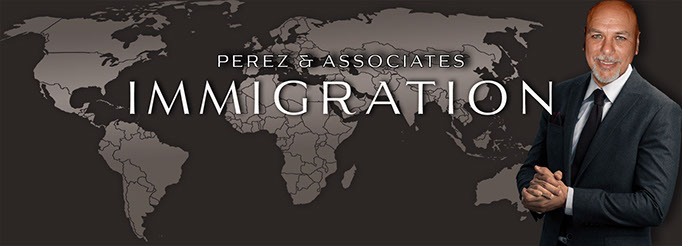Fiancées are a unique category of family immigration law. Unique because they permit a United States citizen to bring to the United States a person who is not a relative based on a promise to marry that person within 90 days of the person’s arrival in the United States. Lawful Permanent Residents cannot petition for fiancées. The fiancée process involves the four steps described below. Three of those steps involve legal processes with UCIS or the Department of State. If any step is not done correctly it can mean substantial delays in the process or the denial of the foreign fiancée's permission to travel to the United States.
Perez & Associates will help you navigate these processes and help you avoid the pitfalls so you and your fiancée can be together as soon as possible.
The sponsor must meet their foreign fiancée in person.
To be able to sponsor a foreign fiancée you, the sponsor, must demonstrate that you have met your foreign fiancée in person during the two-year period just before the filing of the petition with the U.S. Citizenship and Immigration Services (USCIS) in the United States. This means that even if you have identified your fiancée through correspondence, phone calls or a family arrangement, a trip abroad to meet your fiancée in person must take place within the two years prior to the commencement of the legal process. Because of this requirement, when you visit your foreign fiancée, you must make sure you obtain evidence to prove that you met your fiancée in person. This can include copies of airline tickets, hotel receipts, and pictures of the two of you together.
You must petition for your fiancée.
Once you have taken a trip abroad to meet your fiancée, you are ready to begin the legal process with USCIS. The first part of this process is the filing of a Fiancée Petition. This petition is filed with USCIS in the United States and where it is filed depends on where you live. Currently the processing time for the petition is about a year. If there are documents or other information missing from the petition, USCIS will request the additional information before making a decision. This can add another 60-90 days so it is important that the petition be filed correctly the first time.
The foreign fiancée must be interviewed by the U.S. Consulate in their home country.
Once the Fiancée Petition is approved USCIS will send out a Notice of Action letting you know that the petition has been approved. At this point USCIS will forward the file to the U.S. Consulate. The Consulate will then send out additional documentation and forms that need to be completed by you and your fiancée and submitted to the Consulate before they will schedule your fiancée for a visa interview.
Approvals of Fiancée Petitions are only good for four months, although they can be extended for an additional four months. Because the validity is for a relatively short duration no time can be lost preparing the forms and satisfying the other conditions required for the scheduling of a visa interview at the Consulate.
The interview at the Consulate will be the most difficult part of the entire process. Because many Fiancée Petitions involve couples who have only met in person once, there is an elevated level of suspicion among Consular Officers. This is one of the most important reasons for having an attorney represent you. Your fiancée must be carefully prepared to answer the types of questions that typically come up at these interviews. It is highly recommended that you attend the visa interview to address any additional questions raised by the Consular Officer.
At the successful conclusion of the visa interview your fiancée will be issued a K-1 Fiancée Visa. Once the K-1 Visa has been issued your fiancée will be able to travel to the United States.
You must marry your fiancée within 90 days of his or her arrival in the United States and after marrying an application must be filed with USCIS to obtain the fiancée's residency.
The law requires that you and your fiancée marry within 90 days of your fiancée's arrival in the United States. Any legal marriage ceremony is acceptable. If it is impossible to plan a big wedding within 90 days, have a civil marriage within the 90 days and the larger wedding some time thereafter.
Because a K-1 Fiancée Visa was used to enter the United States the fiancée may only marry you. The fiancée will not be able to come to the United States, marry someone else, even another United States citizen, and remain in the United States.
Once the marriage takes place your foreign spouse must file a residency application. Together with the application your foreign spouse will be able to file applications for employment and travel authorization. The length of this process will depend on where you live. Generally, the receipts of filing arrive within three weeks. The final part of the process will be an interview before an Immigration Officer. At the end of this interview your foreign spouse will be made a Conditional Resident of the United States.
FIANCéE VISAS
INVESTOR & BUSINESS IMMIGRATION
Menu
x
FIANCÉE PDF
Let us know how we can help...
Call us today - your future depends on it.
(ALL MAJOR CREDIT AND DEBIT CARDS ACCEPTED)
1303 N. Armenia Ave., Tampa, FL 33607
FAX 813.254.3712
Copyright © 2025 Perez & Associates All Rights Reserve | Disclaimer | Privacy policy | Terms of Use
xclaimagency.com
